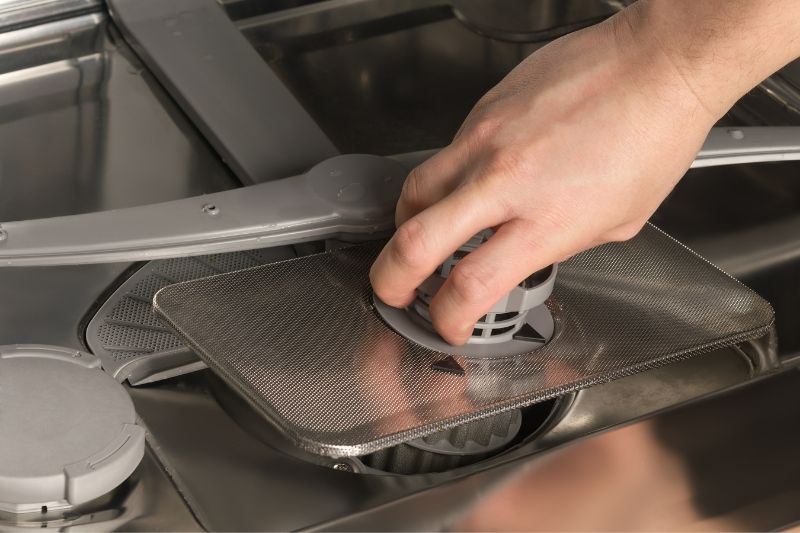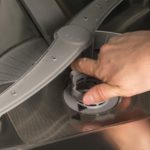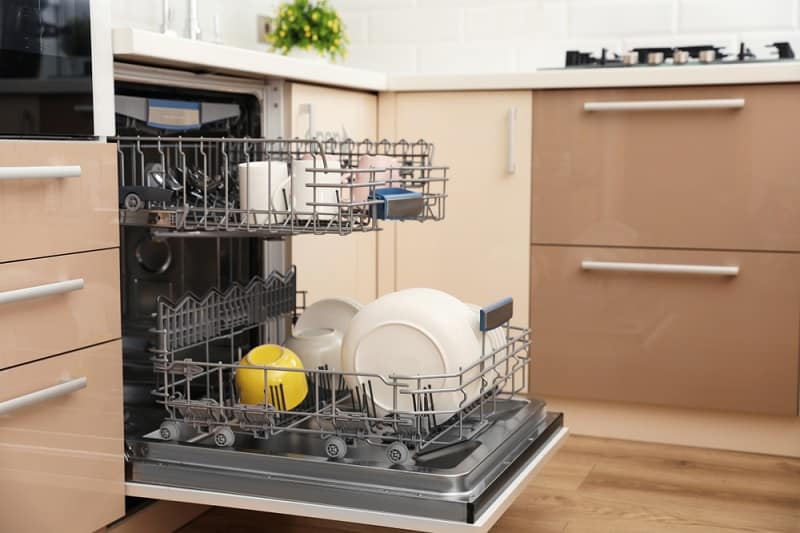A blocked dishwasher can cause havoc in a home. Plates are left piled high, glasses are left filthy, and pots and pans are left with yesterday’s meal inside! Not to mention the smell…
Yet, unblocking a dishwasher is a doddle! Just follow our advice below and you’ll be back to having sparkling wine glasses, pristine plates and spotless pans before you know it – without resorting to time-consuming hand-washing!
Things to Remember
Before you set out to unblock your dishwasher there are a few things you need to do. Here is a list of must-dos and tips:
- Turn off the electricity supply to the appliance
- Turn off the water supply
- Remove any dishes from the dishwasher
- Have old bath towels or kitchen towels ready to soak up excess water
- Have someone ready to help you
- You might need a torch
- Wear gloves
- Grab a screwdriver
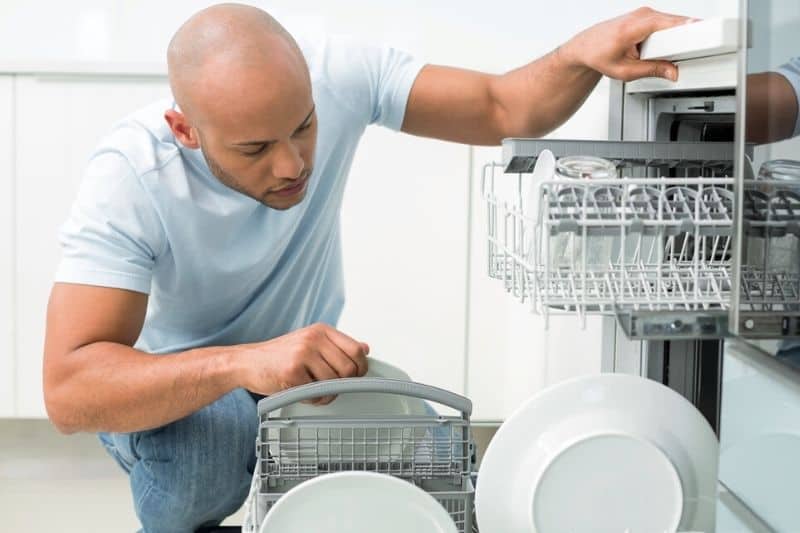
Find the Source of the Blockage
Here’s where your dishwasher is most likely to be blocked up:
- Waste food gets caught in the filter
- The waste hose is blocked up
- Sink waste-pipe is blocked (Sometimes the dishwasher’s waste pipe is connected to the sink’s waste-water pipe)
- The sprayer is clogged up (Dishwasher doesn’t clean your dishes correctly)
If you’re not actually sure what the cause of your blockage is, start by checking your dishwasher’s filter. If it’s not that move on to the waste hose, and finally the sink waste-pipe. But, if you find that your dishes don’t actually come out clean after a cycle, the problem is a blockage in the sprayer arm (Go to the section labelled ‘Sprayer Arm’ for help).
Clean the filter
If you see a lot of standing water in your dishwasher the first thing to check is your filter. Filters typically get blocked up with food that’s been left behind on dirty dishes.
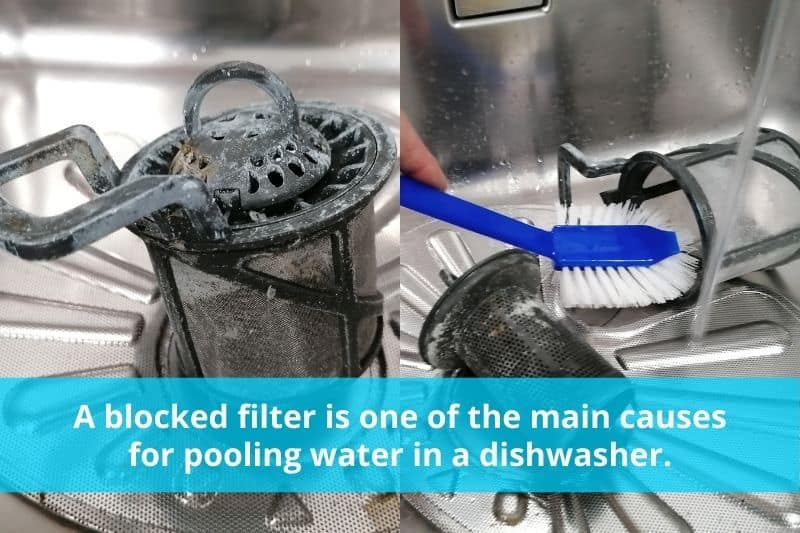
Here’s what you need to do to clean your filter and to unblock your dishwasher:
- Turn the power off
- Turn the water supply off
- Take the baskets out and set them to one side
- Locate the filter – tends to be at the bottom of the dishwasher, just below the spray arm
- Gently pull/twist out the filter – refer to your user manual to see how to remove the filter on your particular dishwasher model
- Be careful not to cut yourself on any sharp food residue left behind
- Run the filter under hot water at your sink and wash away any debris
- Gently rub at it with some soap if need be – not too vigorously
- When you’re doing this, keep an eye on the dishwasher to see if the standing water is going down
- If the water is going down, you need wait and clean out any leftover food from the dishwasher – you may have to scoop the extra water out with a cup too
- Replace the filter when the water has gone – align the cover and the filter correctly
- Always run a cleaning cycle to make sure the blockage has gone
If water is still pooling in the dishwasher after you’ve thoroughly cleaned the filter then the blockage is probably caused by something else.
Just to be extra careful, check if you can see anything at all left in the machine – grease, a big bit of food, or plastic. If you can’t see anything at all you need to check the waste hose.
Waste hose
To check the waste hose, you’ll need to go behind the dishwasher.
If you have a freestanding dishwasher, you’ll be able to move the dishwasher out with the help of a friend. If the dishwasher is integrated, this will be more tricky but not impossible. You’ll probably need to call a professional for help though if your dishwasher is not freestanding.
When the dishwasher has been moved out, the first thing you need to do is to make sure that there are no kinks in the waste hose. The tiniest kink can cause the biggest problem. You also need to fix any kinks you see.
If the hose is sitting comfortably behind the dishwasher, and you can’t see anything wrong, the next thing you need to do is run your hand along the hose to see if you can feel any blockages inside it.
If you feel a blockage, you need to disconnect the waste hose from the back of the dishwasher. Be careful not to spill the contents of the hose on the floor. Then tip the hose into a bucket, and get a small brush/coat hanger to poke inside the hose – do this carefully. Try and clean out the blockage as best as you can.
Be extra careful when you fit the waste hose back onto the dishwasher, and don’t push the dishwasher back into the wall too far – this will crush the waste hose!
Run a cycle to see if the dishwasher has been unblocked. If the problem still persists try looking at the sink waste pipe.
Sink waste pipe
In some homes a dishwasher waste pipe is connected to the sink’s waste pipe – this is normal! But, sometimes if a sink gets blocked up this can cause the dishwasher to block up too.
To see if this is the case with you, try these steps:
- Run your tap
- Watch how fast/slow the water drains out of the sink
- If the water doesn’t move then there’s probably a blockage in the sink pipe
Ways to solve this problem:
- Get some bicarbonate of soda and water and pour this down the sink
- Get some white vinegar and water and pour this down the sink
- Run the hot water tap
- Use a plunger
- Use a specialised sink unblocker, for example:
Once you have tried these steps, run a cycle to see if the dishwasher has been unblocked. If not it might be time to call in a pro-dishwasher cleaner!
Sprayer arm – Dishes are still dirty after a cycle
If you put your dishwasher on and your dishes are still dirty at the end of the cycle, your sprayer arm is blocked. This means that water doesn’t spray out of the arm as it spins around, so the dishes don’t get cleaned.
This is very annoying but can be fixed fairly quickly.
Follow these steps:
- Take the baskets out
- Grab a screwdriver and undo the screw/bolt that holds the sprayer arm in place
- You might have to turn the arm clockwise/anti-clockwise – consult your manual on this
- Run the warm water tap and put the sprayer under the tap
- Gently clean away the dirt – use some soap, if need be
- You might want to get a toothpick and push it slowly into the little holes on the sprayer to clean the grime out
- Get rid of any extra dirt
- Replace the sprayer correctly – this is absolutely vital!
- Run a cycle to see if the blockage has gone and to see if your dishes come out clean
The video below has some great close up footage of a dishwasher’s filter and other components which could be the cause for blockages:
Professional Help
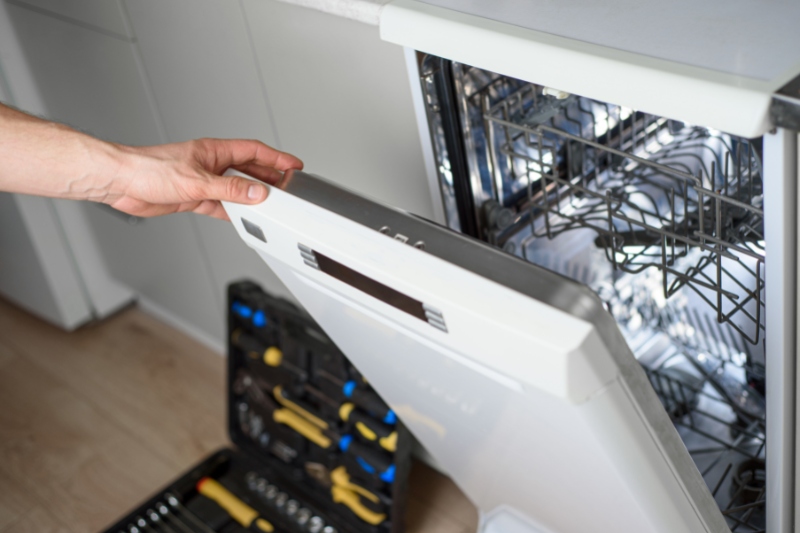
If you’re really not sure what’s causing your dishwasher blockage, and the steps above haven’t worked for you then you need to call professional help.
As it happens there are many companies out there right now who can help you! Plus, if you have a warranty or cover on your dishwasher you can always call the manufacturer up and get advice.
Things to remember:
- Do your research
- Pick a reputable firm
- Ask the company for tips
- Find out what tools and products they use
- Make sure the blockage is gone before they leave
Best Practices
If you don’t want to deal with this issue too often, here are some tips to consider:
- Clean your plates before you throw them into the dishwasher
- Try and avoid putting greasy pots and pans into the dishwasher
- Clean the filter regularly
- Keep an eye on your waste hose – make sure it isn’t crushed
- Make sure you keep your sink clean and free of blockages
- Use specialised cleaners to keep your dishwasher in top-notch condition, for example:
FAQs
Can I put drain unblockers in my dishwasher to unblock it?
No. There are some nasty chemicals in drain unblockers and they just aren’t appropriate for a dishwasher.
Will dishwasher salt help to unblock my dishwasher?
Technically dishwasher salt is used to prevent a build-up of limescale in your dishwasher, so it won’t really stop blockages. Blockages are usually caused by food and grease. You can read more about dishwasher salt here.
Conclusion
Unblocking your dishwasher isn’t very time-consuming, and solving the problem shouldn’t cost you a lot of money. Just remember, if you don’t feel confident in solving the problem by yourself, call for help!
If you want to tell us how you unblock your dishwasher drop us a comment!

Bethan has a passion for exploring, reading, cooking and gardening! When she’s not creating culinary delights for her family, she’s concocting potions to keep her house clean!
